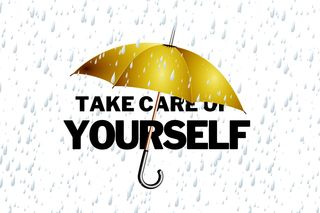Anxiety
COVID-19: Feel Better Now
Leverage self-awareness to improve your self-care and alleviate your anxiety.
Posted April 27, 2020

In some ways, the current pandemic has been like a global tsunami, hitting hard and creating massive turmoil. In other ways, it has been like a real-life horror movie, with people experiencing persistent and rising distress, panic, and confusion. Many are frantic about what might happen next. The result has been a spreading anxiety that is as contagious as COVID-19, and that needs to be slowed.
While it is important to think about the future and consider how you can prevent or lessen potential impacts on your life, you can also attend too much to thoughts about what “might be.” This can lead to filling you with anxiety about the future, leaving no room for the present. And it’s only in the present that you can empower yourself. That’s where learning to be self-aware can help a lot.
One area where self-awareness can work to your advantage is in basic self-care, which is essential in maintaining a sense of well-being. Some core areas of self-care are getting sufficient sleep, healthy eating, regular exercise, connecting with something larger than yourself, and engaging in enjoyable activities.
We have all had the experience of failing to do something we know is good for us – or, conversely, of doing something we know is bad for us. You might stay up late to watch a movie, knowing full well that you need to get up early for work – and the result is not going to be pretty. Or, if you are not working, you might be staying in pajamas, lying around, and eating comfort food – all of which you know is adding to your depression or anxiety about life. If you are feeling overwhelmed by anxiety, loneliness, or distress of any kind, it’s time to seriously consider making a change to those destructive habits.
The place to begin is to pay attention to how your behaviors are affecting your physical and emotional health. Admonishing yourself with statements like I know I should be eating better is often not enough to create sufficient motivation to change. Instead, you must be open to how your current behaviors are affecting you and how changing those behaviors would make life better.
For instance, with regard to eating a healthy diet, try the following: Pay attention to what you eat, when you eat, and how aware you are of the experience of eating (as opposed to mindlessly eating while you play on your phone, or engage in anything else). Pay attention to how your body feels in response to eating different foods. You may notice a sluggishness after eating your favorite comfort foods, or a lack of energy through the day until you finally eat your first bite. You may also notice that after you eat a balanced meal, you feel energized. By attending to these kinds of observations, you help yourself to feel more motivated to eat healthily.
With regard to getting sufficient sleep, try this: Pay attention to the effects of getting insufficient sleep. You might notice that you have low energy, muddled thinking, and feel cranky. By contrast, after getting sufficient sleep, you might notice that you are energized, think clearly, and are happier. (If you have a sleep debt, you may need to sleep well for a few nights before you feel these positive effects.) With this self-awareness, you will likely feel more committed to doing what it takes to get sufficient rest.
Unfortunately, after gaining a deep appreciation of your poor choices, you might be self-critical, hammering home how “stupid” you are for making those decisions. And that’s likely to make you give up or feel badly even as you persist. By contrast, you are much more likely to make better choices if you feel encouraged, as opposed to criticized. For this reason, responding to your self-awareness with self-compassion (compassionate self-awareness) is much more helpful.
Think about how a supportive friend might respond. For instance, they might empathize with how tempting it is to stay in bed all morning and get caught up in YouTube videos, wanting to just hide from the world. Then, from that compassionate perspective, they might help you to problem-solve a plan for getting moving in the mornings.
With all the stress and anxiety surrounding COVID-19, there will likely be times you fall short of taking good care of yourself. And you are definitely not alone. So, it’s essential that you learn to respond with compassionate self-awareness (To learn more, click here.). By connecting with what it feels like to act in healthy and unhealthy ways, you can develop the motivation and ability to nurture inner strength with a strong foundation of self-care.
If you would like to learn more about this topic, check out this brief video:
Making Change blog posts are for general educational purposes only. They may or may not be relevant for your particular situation, and they should not be relied upon as a substitute for professional assistance.
Making change through compassionate self-awareness




